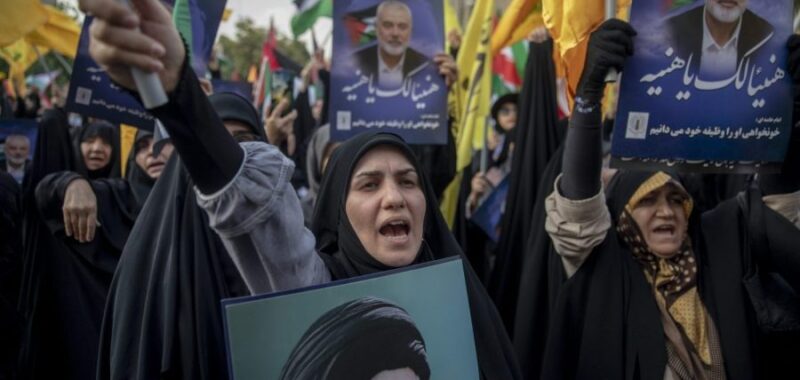
A alleged Israeli airstrike in Tehran has killed Ismail Haniyeh, a senior Hamas leader, putting the Middle East once again at the center of geopolitical strife.
This act threatens to derail any remaining hopes for a breakthrough in the stagnant Gaza peace talks. Haniyeh was in Tehran alongside other senior figures of Iran’s “axis of resistance” — encompassing Hamas in Gaza, Hezbollah in Lebanon and the Houthis in Yemen — attending the inauguration of Iran’s newly elected president.
The timing and location of the strike have amplified tensions, potentially setting the stage for further conflict and diminishing the prospects for diplomacy in the war-torn region. The intricate web of alliances and enmities in the Middle East grows ever more complex, with each event echoing through the corridors of power from Tehran to Jerusalem, and beyond.
The immediate implication of this event is stark: Benjamin Netanyahu and his hardline associates are clearly not open to any cease-fire with Hamas. Haniyeh’s death came just hours after Israel executed a separate strike on a Hezbollah commander in Beirut, a retaliation for an earlier attack on an Israeli-controlled town that tragically killed 12 children and teenagers.
Before these strikes, there was cautious optimism that Israel and Hamas were nearing an agreement to pause the nearly 10-month-old war in Gaza. Haniyeh was a key negotiator in the ongoing talks, which were mediated by Egypt, Qatar and the United States. These negotiations are aimed at ending the war in Gaza in exchange for hostages captured during the Hamas-led attack on Israel.
The assassination in Tehran now leaves Israel bracing for potential retaliation from both Hamas and Hezbollah for their slain leaders, as well as from Iran for the killing within its borders. The prospects for peace appear increasingly dim, overshadowed by the specter of violence.
Failing to protect an allied leader within its capital is a serious embarrassment for Iran. Haniyeh had met with Ayatollah Ali Khamenei, Iran’s supreme leader, on Tuesday shortly before his death. This incident not only reflects the vulnerabilities within Iran’s security apparatus but also raises serious questions about the safety of Iran’s top leaders and Israel’s capability to target them with precision.
In April, Israel and Iran teetered on the brink of war when Israel struck Iran’s embassy in Damascus. Iran retaliated, and Israel countered, leading to an unprecedented exchange of strikes on each other’s territory — more symbolic than substantial, because neither side wanted further escalation at that time.
But, more than Hamas, it is the reaction in Tehran that is in the spotlight, as President Masoud Pezeshkian faces this crisis within 24 hours of taking office. Ayatollah Khamenei declared that avenging Haniyeh’s death is a duty for Iranians, stating that Israel has “prepared a harsh punishment for itself” by killing “a dear guest in our home.” This rhetoric has undoubtedly put immense pressure on Pezeshkian to respond to Israel.
But Iran is unlikely to respond with a direct or serious military strike. Historically, Iran has favored indirect tactics, engaging in clandestine proxy warfare rather than open confrontation. Pezeshkian’s response is expected to be more of a calculated display of strength aimed at reassuring his domestic audience, rather than a genuine attempt to escalate tensions with Jerusalem.
While the rhetoric may be fiery, Iran’s actions will likely be measured and strategic, aiming to maintain a balance between satisfying domestic calls for vengeance and avoiding full-scale conflict. This approach would reflect Iran’s longstanding strategy of using proxies to project power and influence without inviting direct military confrontation.
The Iranian regime, acutely aware of the catastrophic consequences of a direct confrontation with Israel, is likely to tread cautiously to avoid providing a pretext for military intervention. The preservation of its nuclear facilities, crucial to its long-term ambitions, dictates a measured response calibrated to avoid escalation.
Tehran seems convinced that, in an all-out conflict, Israel would deliver a crippling blow to Hezbollah, its key ally. At this moment, Tehran prefers to distance its Syrian and Iraqi factions from a full-blown war to safeguard its crucial trans-regional networks. Iraq holds greater strategic importance for Iran than Hezbollah does, and Tehran is unwilling to jeopardize it in a conflict in southern Lebanon.
The strategic calculus in Tehran is clear: avoid escalation, protect critical assets and maintain the delicate balance of power in the region. This approach underscores Iran’s preference for proxy warfare and strategic patience over direct military engagement. Perhaps this explains why U.S. Secretary of Defense Lloyd Austin has expressed optimism about achieving a diplomatic resolution and deescalating the situation.
Imran Khalid is a geostrategic analyst and freelance writer. He is a physician and has a master’s degree in international relations.

